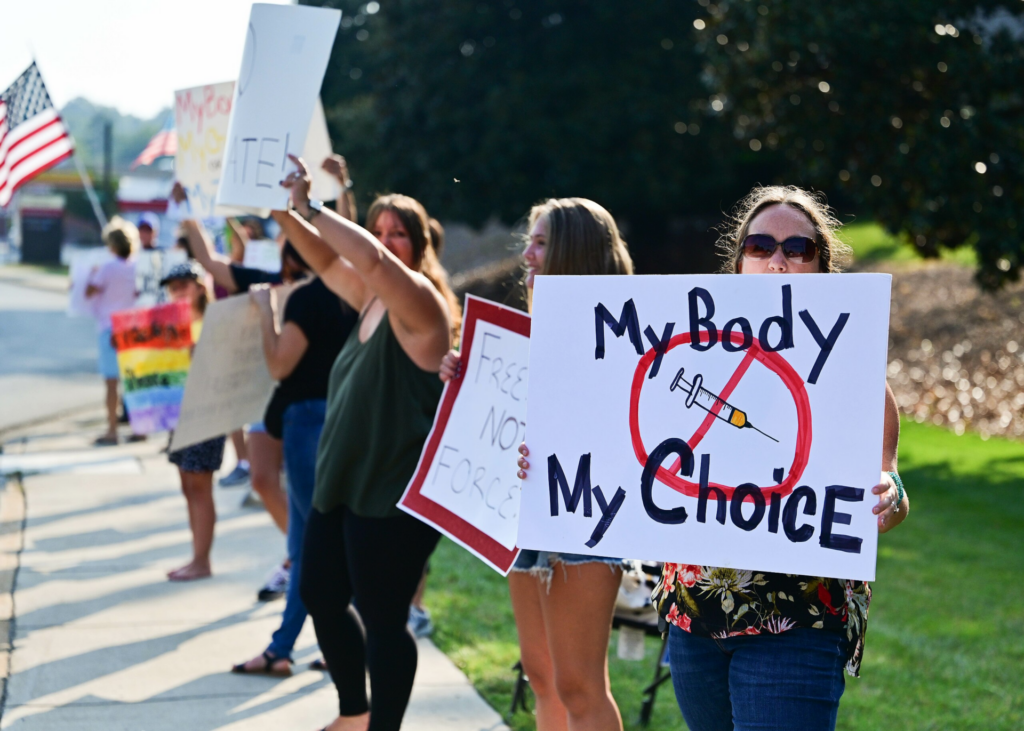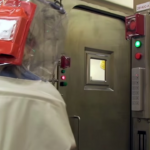COVID vaccines went ‘on trial.’ Are routine childhood vaccine mandates at risk?
By James G. Hodge, Jr., Jennifer L. Piatt, Erica N. White, Leila F. Barraza | November 24, 2023
 A vaccine protest in 2021. Credit: Anthony Crider via Wikimedia Commons. CC BY 2.0.
A vaccine protest in 2021. Credit: Anthony Crider via Wikimedia Commons. CC BY 2.0.
Vaccines, one of the greatest public health achievements of the 20th century, proved their worth, yet again, in response to one of the greatest infectious disease threats of all time: COVID-19. Approximately 70 percent of Americans completed the original primary series of COVID vaccines, helping to restart the global economy and allow people to escape social isolation. These vaccines prevented an estimated 3.2 million deaths nationally between December 2020 and November 2022. Millions more were spared the risks of extensive hospital stays, extended illness from “long-COVID,” and other substantial harms. Earlier this year, researchers contributing to the science underlying the vaccines were awarded a Nobel Prize.
Despite this positive track record, significant skepticism remains about COVID and other vaccines. Scores of Americans refused to get vaccinated during the pandemic despite strong incentives and clear dangers to their and their families’ health, a trend that has intensified in recent years. Just 17 percent of Americans received the critical omicron booster shot offered in late 2022. Considerably fewer (7.1 percent of adults and 2.1 percent of children as of October 14) have sought the updated COVID vaccines that became available this fall. One of the most contentious pandemic-era debates—fueled by apathy, safety concerns, misinformation, and government distrust—involves the use of vaccine mandates by governments, schools, and employers to boost COVID vaccination rates.
Although the United States has a long-standing and legally supported history of vaccination requirements in certain contexts, the COVID pandemic witnessed scores of lawsuits challenging them, as political and media figures vilified vaccination and other public health measures. These lawsuits touched on constitutional issues and statutory concerns, with plaintiffs seeking exemptions or an end to mandate enforcement altogether. And while several states have moved to further restrict or eliminate vaccine mandates, the Supreme Court has opened the door to increased challenges under the Civil Rights Act, which may heighten exemptions that could undermine the efficacy of vaccine efforts. COVID’s tidal wave of lawsuits, state legislation, and vaccine skepticism evince an environment where vaccines are truly “on trial.”
COVID-19 vaccine incentives and mandates. With the issuance of multiple emergency use authorizations by the Food and Drug Administration beginning in December 2020, initial COVID vaccines were allocated first to at-risk health care workers and then to others over several priority stages. By February 2021, Americans were waiting in long lines at stadiums and other centralized sites across many US cities, vying for access to free COVID vaccines. The initial push for access to the shots quickly waned. Even as available supplies rose, the numbers of Americans actively seeking vaccinations plummeted by spring, before most communities reached anything close to “herd” immunity.
In response, the public and private sectors pivoted rapidly to reverse growing public apathy and resistance to vaccinations. Raffles, lotteries, gift cards, college scholarships, travel vouchers, and even free beer, doughnuts, and marijuana were offered to entice individuals across states and localities to get vaccinated. So long as they are equitably distributed, such incentives are lawful and can work. A 2023 systematic review confirmed that financial rewards positively impacted personal decisions to get vaccinated.
Yet, incentives alone were not enough to sufficiently raise vaccination rates. Governments and private employers turned increasingly in 2021 to mandates (coupled with optional test requirements) to garner compliance among employees, students, health care workers, and others. For over a century, states and localities have authorized vaccine mandates as a condition of participation in work, school, or other activities. The Supreme Court has largely approved non-forcible vaccine requirements since 1905. These measures have proven effective, especially during disease outbreaks or pandemics.
During the COVID pandemic, states and localities set numerous COVID vaccine requirements. Hundreds of colleges and universities mandated vaccination for on-campus faculty and students during the 2021-2022 academic year. Secondary and elementary school teachers and students in multiple jurisdictions were inoculated or regularly tested. Higher-profile mandates arose as well. By September 2021, President Joe Biden announced a series of measures requiring COVID vaccination for federal employees/contractors, military service personnel, health care providers, large company employees, and select federally funded educators.
Judicial challenges. Through extensive lawsuits challenging these and other COVID vaccine mandates, litigants alleged violations of their bodily autonomy, privacy, religious freedoms, philosophical beliefs, and rights to refuse medical treatment. Initially, most courts spurned these constitutional challenges, in light of historical legal support for mandates and the sheer public health threat posed by the pandemic. According to one source, between April and October 2021, 30 courts refused to block vaccine mandates.
In one closely watched case, a federal judge in July 2021 approved Indiana University’s broad vaccine mandate affecting students and faculty to protect the public’s health. The plaintiffs appealed the decision to the Supreme Court, which turned away a chance to review and overturn the decision.
In select cases, however, courts rejected governmental and private sector policies requiring COVID vaccines. Some judges expressly disdained vaccine mandates that disallowed exemptions, largely on grounds of perceived infringements of religious freedoms.
In January 2022, the Supreme Court struck down the Occupational Health and Safety Administration’s vaccinate-or-test requirement for large employers. At the same time, the Court upheld a separate federal mandate requiring vaccinations for health care workers. This mandate was required for health care facilities to continue receiving funding from the Centers for Medicare and Medicaid Services. As such, the Court ruled it was an acceptable exercise of the government’s federal spending powers. In the case of the large-employer mandate, however, the Court determined that the government had overstepped its authority to regulate interstate activities. To date, the Court continues to ponder the constitutionality of Biden’s federal contractor mandate even though the national public health emergency sustaining it was voluntarily lifted in May 2023.
Exemptions. Even where mandates remain intact, their continued effectiveness depends on compliance, and that compliance rate has recently been dropping. The Centers for Disease Control and Prevention and the Equal Employment Opportunity Commission (EEOC) have documented precipitous increases of Americans claiming religious or non-medical exemptions. Some challengers argue for exemptions from governmental vaccine mandates pursuant to the First Amendment’s free exercise of religion clause.
Neither the Supreme Court nor most lower courts specifically recognize a constitutional guarantee to religious exemptions from neutral and generally applicable vaccine mandates. Generally, the Court considers a law to be neutral when it does not target religion specifically. Recently, it has signaled that vaccine mandates providing medical exemptions, but not religious ones, may not be considered neutral, which could lead to stricter scrutiny.
While the Court has not directly reviewed a case asserting constitutional free-exercise-of-religion arguments against mandates, a ruling this past June could open the door to further exemptions on statutory grounds. In Groff v. DeJoy, which involved an evangelical Christian postal service employee who did not believe in working on Sundays, the Court clarified requirements under Title VII of the federal Civil Rights Act. Under the law, employers must offer employees religious accommodations that are not unduly burdensome. Though not specifically about vaccine mandates, the Court’s conclusion substantially raised the bar on what actually constitutes an “undue burden” for employers, complicating employee adherence to mandates in the future, especially in nursing and other health care sectors. Already, in September 2023, the Equal Employment Opportunity Commission filed two lawsuits alleging that employers had failed to properly accommodate employees seeking exemptions from their employers’ COVID vaccine policies.
Absent affirmative First Amendment protections requiring religious exemptions, governments can ignore or eliminate broad religious exemptions without tripping federal constitutional requirements. In 2021, Connecticut joined five other states offering no religious exemptions to school vaccine requirements, immediately engendering litigation. In August 2023, the federal Court of Appeals for the Second Circuit dismissed free exercise challenges to Connecticut’s law, although additional claims are proceeding.
In other states, court rulings or laws are expanding exemptions. In April 2023, a federal court required Mississippi to allow religious exemptions from school vaccination requirements. For decades, the state had among the highest state vaccination rates among school-aged children, in part owing to its limited exemptions. Such rates may decline in the years ahead based on this decision.
Shifting vaccine attitudes. Judicial treatment of COVID mandates partly reflects shifting national views over vaccinations generally. Skeptical attitudes furthered by influential, well-funded anti-vaccine efforts contributed to legislative reforms, as well.
During the pandemic, elected representatives in key vaccine-adverse jurisdictions introduced and passed legislation banning private businesses, and even state and local governments, from requiring COVID vaccinations. By the end of June 2023, 26 states had legislatively limited COVID vaccine mandates.
Negative assessments in many states have not been limited to COVID public health measures. Some jurisdictions are re-assessing long-standing school vaccination requirements, enacting legislation to make exemptions easier. For decades, all states have conditioned school attendance on meeting a full schedule of childhood vaccinations. Courts have routinely authorized employer vaccine mandates, especially in the health care sector. These public health laws are now under attack. Montana’s legislature attempted to ban vaccine mandates, excepting pre-existing school requirements, until a federal court found the measure unconstitutional in late 2022. Earlier this month, Texas Governor Greg Abbott signed the “Vaccine Freedom Bill” prohibiting mandates by private employers.
National attitudes, adverse public health laws, and judicial decisions are chipping away at one-time solid childhood vaccine rates. Only 65 percent of parents in December 2022 believed healthy children should be required to be vaccinated against measles, mumps, and rubella (MMR) to attend school, down from 76 percent in October 2019. In November 2023, the CDC reported that US parents seeking exemptions from childhood vaccine requirements during the 2022-2023 school year reached the highest level ever. National averages for school vaccinations plateaued at approximately 93 percent this past year, which is sufficiently below recommended compliance levels. Consequently, new vaccine-preventable disease outbreaks among schoolchildren are virtually assured.
Ongoing legal and policy challenges around vaccinations unnecessarily threaten the health of children, patients, workers, and communities overall. Legislatures or courts broadening vaccine exemptions is specious. Rescinding long-standing vaccine mandates on grounds of personal autonomy, misinformation, and governmental distrust is indefensible.
Efficacious vaccinations allocated fairly and administered safely are indispensable to reducing death and illness tied to emerging infectious diseases. With routine contagions like measles, mumps, and rubella making comebacks, advanced strains of COVID and annual flu re-surfacing, and new, emerging infectious conditions always on the horizon, legal and political rejection of vaccine mandates and greater allowances of exemptions are antithetical to proven public health practices.
Together, we make the world safer.
The Bulletin elevates expert voices above the noise. But as an independent nonprofit organization, our operations depend on the support of readers like you. Help us continue to deliver quality journalism that holds leaders accountable. Your support of our work at any level is important. In return, we promise our coverage will be understandable, influential, vigilant, solution-oriented, and fair-minded. Together we can make a difference.
Keywords: COVID-19, Supreme Court, vaccine mandates
Topics: Biosecurity

















